Horthy and the age-old "cultural trauma" of the Hungarians
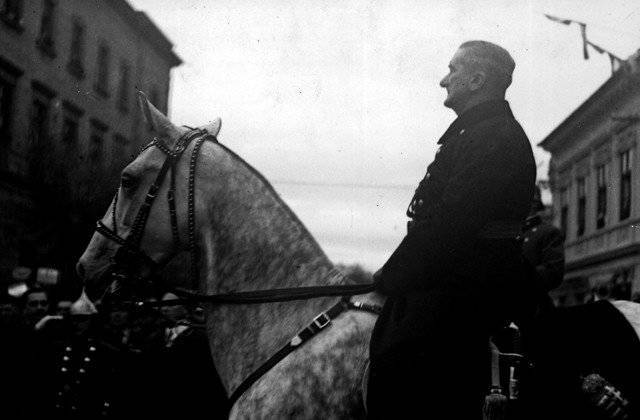
As the Hungarian leader Miklos Horthy tried to regain the lands lost after the First World War, he fought on Hitler’s side and why the assessment of his rule is still key for Hungarian politics.
The emergence of the Miklos Horthy regime was largely predetermined historical country experience. For four centuries, Hungary was only part of other states. For the first time, the Kingdom of Hungary lost its independence as a result of the Turkish conquests, and then became an integral part of the Austrian Empire. Numerous revolts (the most serious in 1703 and 1848) did not bring success. Only in 1867, after the defeat of Prussia, was the Austrian emperor forced to make concessions and grant Hungary the broadest autonomy: thus the kingdom of Austria-Hungary was formed. But the nationalist mood in the country did not weaken, as did the desire for complete independence. The defeat of the dualistic monarchy in the First World War and its subsequent collapse became a turning point in Hungarian history.
As a result of the war, Hungary suffered territorial losses incomparable even to the losses of the German and Russian empires. Under the Treaty of Trianon, the country lost two thirds of its pre-war territory, and three million Hungarians ended up on the territory of other states, primarily Romania, which received Transylvania and part of Slovakia. As historian Deborah Cornelius notes, “the Hungarians still have not recovered from the sense of injustice caused by the division of their kingdom.” It was the Treaty of Trianon and the subsequent division of the country that predetermined the appearance of the Horthy regime and the subsequent foreign policy of the country.
Trianon was the fact that the American sociologist Jeffrey Alexander called the concept of "cultural trauma." That is, the future is determined by the past, which remains deep in the memory of the community (people, ethnic or religious group). The victims of the tragedy of the Treaty of Trianon became the Hungarian nation - this is how it is perceived in the country, and the world community is responsible for this. This is reflected in all spheres of public life in the country - from political to cultural.
It was the stay in the state of “cultural trauma” that determined the high support of the revanchist Miklos Horthy, to which his key role in the harsh suppression of the Hungarian socialist revolution 1918 — 1919 contributed a lot. Having come to power, Horthy immediately identified himself as a successor of the Hungarian history. His title was not the president or the prime minister, but the regent of the Kingdom of Hungary. Continuity with the old Hungarian kingdom and the desire to restore the lost greatness of the country became the main leitmotif of Horthy’s domestic and foreign policy.
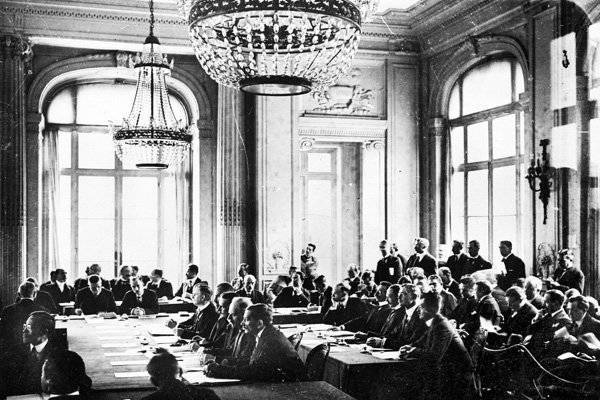
There was no monarch in the Kingdom of Hungary state - he could not be elected because of the threat of war with neighboring powers. Therefore, Horthy became "regent in a kingdom without a king." Given that the Hungarian ruler retained the title of admiral, which he obtained while serving in the Navy of Austria-Hungary, in the complete absence of the country fleet Horthy's title looked strange in the eyes of the European community, but embodied the ambitions of the new state.
Hortism as a political platform
Unlike other authoritarian and totalitarian regimes, hortism focused on specific tasks: the return of lost lands and the fight against communism. In accordance with them, the younger generation was brought up. Thus, the teaching of geography in schools was conducted on maps with the pre-war borders of Hungary. Every day, students recited an oath:
I believe in God!
I believe in one homeland!
I believe in the eternal divine truth!
I believe in the rebirth of Hungary!
As historian Laszlo Kurti notes, “the loss of territories was perceived as a harbinger of the death of the nation, which could only be prevented by the revival of Great Hungary. But here a problem arose for the authorities of the country: they set the task of returning the territories with the predominant Hungarian population, and a considerable part of the revanchist-minded society demanded the return of all the so-called “Crown lands”, that is, the ancient Hungarian kingdom. It included all of Slovakia, parts of Serbia and Croatia, and about half of Romania. The crown of the first Hungarian king, St. Stephen, the country's national relic, became the symbolic embodiment of these aspirations. A significant role in the formation of these radical demands was played by the Hungarian Catholic Church.
The next important problem in the country was the Jewish question. And again, there was a certain split between how Horthy saw this problem and public opinion. After the collapse of the monarchy and defeat in the war, the country experienced a severe economic crisis, the society began to search for "guilty", which eventually became the Jewish community. But despite the generally anti-Semitic sentiments in society and the numerous attempts of extreme right-wing political forces led by the Nazi Crossed Arrows party to outlaw Jews, the law on proportional admission of students to universities was the only serious defeat of the latter in rights. According to it, the Jewish minority, which constituted 6% of the country's population, could count only on 6% of places in universities, whereas the real percentage of Jewish students in some faculties was almost 50%. Hortism did not include ethnic cleansing or genocide. The regent tried to balance between various conservative political trends, clearly preferring moderate nationalism and appealing to the idea of the return of the lost lands that united the whole nation.
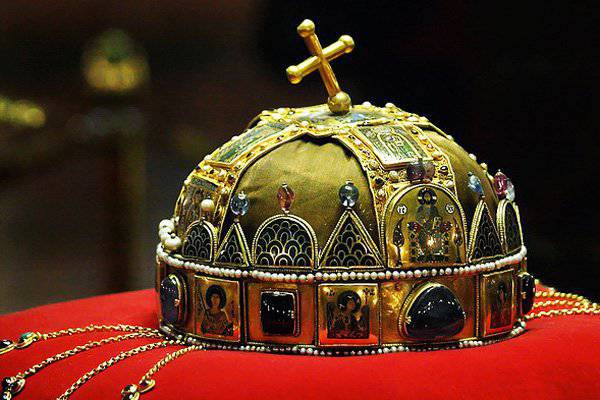
For Horthy’s politician, the far-right pro-German forces were no less a threat than the Communists, because, because of their radical nature, they threatened to drag the country into a protracted conflict in which it would not pursue any personal gain. As a pragmatist, Horthy sought to use diplomacy and refrain from the use of military force, given the combat capability and strength of the Hungarian army.
Hungary and World War II
With the current situation in Europe at the end of the 30-s, Hungary did not have options when choosing a side in a future conflict. Nazi Germany was a state that could help at least partially satisfy the territorial ambitions of Budapest. Moreover, because of its geographical position, Hungary turned out to be on all sides bordering with countries, either occupied by Germany or becoming its allies. Under these conditions, Horthy went to an alliance with Berlin in exchange for Hitler's promise to return the territories where the majority of the population were Hungarians, which was formalized by the Vienna arbitrations in 1938 and 1940. As a result, southern Slovakia and a large part of Transylvania moved to Hungary. After the German invasion of Yugoslavia, the Hungarian army occupied Vojvodina. The Hungarian Prime Minister Pal Teleki, who signed the Eternal Friendship Treaty with Yugoslavia in 1940, was unable to resist the invasion of Yugoslavia, and committed suicide.
Hungary did not immediately enter the war with the Soviet Union - the bombing of the Soviet Union became a formal sign aviation the city of Kosice. It is still not known exactly which aircraft struck. There are versions of both the Soviet bombardment and the German (or Romanian) provocation. But the attack was used as a pretext for declaring war on the Soviet Union; Horthy joined it on June 27, 1941.
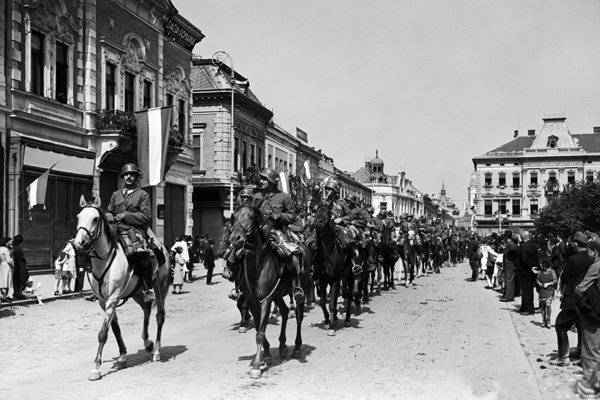
Virtually the entire Hungarian army was destroyed at Stalingrad. Horthy began to try to get out of the war and began secret negotiations with the Western powers. However, an attempt to withdraw from the alliance with Germany led only to the entry of German troops into the country, followed by the genocide of Hungarian Jews and eventually the arrest of Horthy and his replacement with the pro-German Crossed Arrows leader Ferenc Salash. After the war, Hungary was in the sphere of interests of the USSR.
Hortism in today's Hungary
The ideas of Horthy still largely determine the Hungarian political and intellectual life. His reign did not become a taboo topic in Hungarian society, unlike Nazism in modern Germany.
First, unlike the political program of Hitler, the Horthy program is built solely on the principles of conservative nationalism. Until recently, he tried to resist the strengthening of far-right political parties, because he believed that the latter harm the national interests of the kingdom.
Secondly, before the occupation of Hungary by the Nazi troops in the country there was no genocide, which allowed the Hungarian public opinion to shift the responsibility for the extermination of Jews to German national socialism.
Third, the problem of “cultural trauma” after World War I did not disappear even after 1945. The success of the right-wing political parties FIDES and For the Best of Hungary (Jobbik) is largely due to revanchist rhetoric, which almost literally copies the statements of politicians of the Horthy era. “Cultural injury” is aggravated by the fact that it is not adequately covered and reflected in the European community. “The mistake of the Hungarians was that they still could not make the tragedy of Trianon part of the narrative of the general European catastrophe of the 20th century,” said Hungarian philosopher Peter Bendek.
The era of Horthy certainly cannot be considered a historical phenomenon for modern Hungary. As long as the problem of a divided nation is relevant, ideas of revanchism will find a response in the political preferences of the country's citizens. The oaths that were repeated by Hungarian schoolchildren in the 20 and 30 years are reflected in the new constitution, according to which the people of Hungary are united by God and Christianity. Modern intra-Hungarian discourse returns again and again to the discussion of the problems of Trianon. The fact that the EU countries ignore the fundamental question of granting autonomy to the so-called Trianonian Hungarians, who live primarily in Transylvania and southern Slovakia, only adds the advantage of far-right, such as Jobbik.
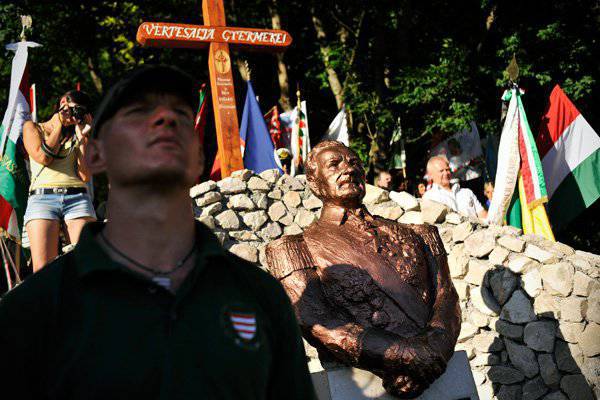
The figure of Horthy, who became one of the incarnations of Hungarian nationalism, is one of the main myths of the modern Hungarian cultural space and is actively promoted by the ruling party FIDES. According to the Regent’s personality, a split takes place in the history between political forces that favor renewed Hungarian nationalism and those who emphasize liberal European integration promoted by Brussels. On the side of the latter is the argument about the counterproductiveness of policies aimed, albeit in the long term, at changing the borders in Europe and endangering relations with Europe. Right-wing forces rely on the pain of an old injury and the desire to restore historical justice.
Miklos Horthy is not just a historical figure. He is the embodiment of the dilemma still facing Hungarian society. The path chosen by him to restore the greatness of his country led her to another loss of independence. The choice of the future path remains with the current generation of Hungarians.
Information